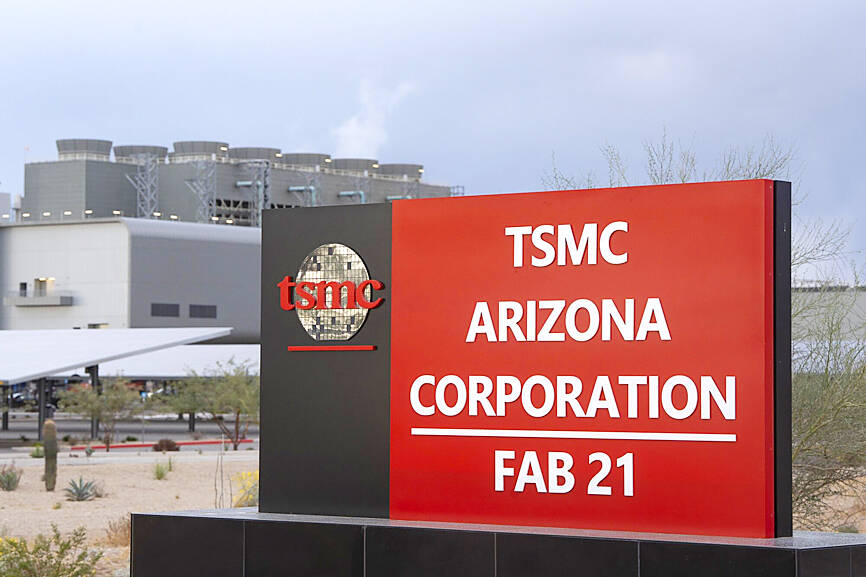Taiwan Semiconductor Manufacturing Co’s (TSMC, 台積電) plan to increase its investments in the US by US$100 billion would provide the company with long-term strategic advantages, researchers said on Wednesday.
Taiwan Ratings Corp (中華信評) said that TSMC’s investment plan — if implemented successfully — would help the company “reduce the risk of its assets being concentrated in Taiwan over the long term.”
Such a strategy would “alleviate geopolitical and trade policy risks,” the ratings agency said in a report, alluding to potential tariffs that many fear Washington could levy against Taiwan’s domestic chip industry.

Photo: Bloomberg
The report said that even if TSMC’s capital expenditure increases to US$50 billion to US$55 billion per year from this year to 2027, the most valuable company on the local stock exchange “should still be able to maintain a net cash position supported by strong profitability and operating cash flow.”
However, according to Taiwan Ratings’ parent company, S&P Global Co, TSMC’s new production capacity in the US would take longer to achieve profitability than if such capacity was built in Taiwan.
US President Donald Trump and TSMC chairman C.C. Wei (魏哲家) on Monday jointly announced that the Taiwanese chip manufacturer would invest the 12-figure sum to build facilities, including three wafer fabs and two advanced packaging plants in the US.
TrendForce Corp (集邦科技) said that even if TSMC’s US$100 billion investment goes smoothly, the planned fabs would “enter mass production after 2030 at the earliest.”
Although TSMC’s production capacity in the US could reach 6 percent by 2035, its production capacity in Taiwan would remain at or above 80 percent, the Taipei-based market researcher said in a separate report.
TrendForce emphasized that TSMC’s latest investment pledge is a continuation of a longer-term trend in the company’s supply chain differentiation strategy.
The Taiwanese chip behemoth accelerated this strategy after 2018 due to factors including “global trade disputes” and the COVID-19 pandemic, which persuaded governments worldwide to seek to build production capacity in semiconductor technologies in local markets, the report said.
However, TSMC’s plan to expand its investment in the US would contribute to a decline in Taiwan’s dominance of the global chip industry over the next five years, the report said.
Taiwan held a 71 percent global market share in the production of advanced processes and 53 percent for mature processes in 2021, but that would drop to 58 percent and 30 percent respectively by 2030, TrendForce said.

CHIP RACE: Three years of overbroad export controls drove foreign competitors to pursue their own AI chips, and ‘cost US taxpayers billions of dollars,’ Nvidia said China has figured out the US strategy for allowing it to buy Nvidia Corp’s H200s and is rejecting the artificial intelligence (AI) chip in favor of domestically developed semiconductors, White House AI adviser David Sacks said, citing news reports. US President Donald Trump on Monday said that he would allow shipments of Nvidia’s H200 chips to China, part of an administration effort backed by Sacks to challenge Chinese tech champions such as Huawei Technologies Co (華為) by bringing US competition to their home market. On Friday, Sacks signaled that he was uncertain about whether that approach would work. “They’re rejecting our chips,” Sacks

Taiwan’s long-term economic competitiveness will hinge not only on national champions like Taiwan Semiconductor Manufacturing Co. (TSMC, 台積電) but also on the widespread adoption of artificial intelligence (AI) and other emerging technologies, a US-based scholar has said. At a lecture in Taipei on Tuesday, Jeffrey Ding, assistant professor of political science at the George Washington University and author of "Technology and the Rise of Great Powers," argued that historical experience shows that general-purpose technologies (GPTs) — such as electricity, computers and now AI — shape long-term economic advantages through their diffusion across the broader economy. "What really matters is not who pioneers

BUBBLE? Only a handful of companies are seeing rapid revenue growth and higher valuations, and it is not enough to call the AI trend a transformation, an analyst said Artificial intelligence (AI) is entering a more challenging phase next year as companies move beyond experimentation and begin demanding clear financial returns from a technology that has delivered big gains to only a small group of early adopters, PricewaterhouseCoopers (PwC) Taiwan said yesterday. Most organizations have been able to justify AI investments through cost recovery or modest efficiency gains, but few have achieved meaningful revenue growth or long-term competitive advantage, the consultancy said in its 2026 AI Business Predictions report. This growing performance gap is forcing executives to reconsider how AI is deployed across their organizations, it said. “Many companies

China Vanke Co (萬科), China’s last major developer to have so far avoided default amid an unprecedented property crisis, has been left with little time to keep debt failure at bay after creditors spurned its proposal to push back a looming bond payment. Once China’s biggest homebuilder by sales, Vanke failed to obtain sufficient support for its plan to delay paying the 2 billion yuan (US$283.51 million) note due today, a filing to the National Association of Financial Market Institutional Investors showed late on Saturday. The proposal, along with two others on the ballot, would have allowed a one-year extension. All three